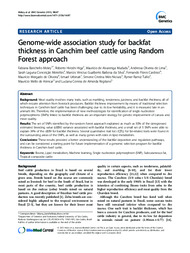Genome-wide association study for backfat thickness in Canchim beef cattle using Random Forest approach.
Genome-wide association study for backfat thickness in Canchim beef cattle using Random Forest approach.
Author(s): MOKRY, F. B.; HIGA, R. H.; MUDADU, M. de A.; LIMA, A. O. de; MEIRELLES, S. L. C.; SILVA, M. V. G. B. da; CARDOSO, F. F.; OLIVEIRA, M. M. de; URBINATI, I.; NICIURA, S. C. M.; TULLIO, R. R.; ALENCAR, M. M. de; REGITANO, L. C. de A.
Summary: Background: Meat quality involves many traits, such as marbling, tenderness, juiciness, and backfat thickness, all of which require attention from livestock producers. Backfat thickness improvement by means of traditional selection techniques in Canchim beef cattle has been challenging due to its low heritability, and it is measured late in an animal?s life. Therefore, the implementation of new methodologies for identification of single nucleotide polymorphisms (SNPs) linked to backfat thickness are an important strategy for genetic improvement of carcass and meat quality. Results: The set of SNPs identified by the random forest approach explained as much as 50% of the deregressed estimated breeding value (dEBV) variance associated with backfat thickness, and a small set of 5 SNPs were able to explain 34% of the dEBV for backfat thickness. Several quantitative trait loci (QTL) for fat-related traits were found in the surrounding areas of the SNPs, as well as many genes with roles in lipid metabolism. Conclusions: These results provided a better understanding of the backfat deposition and regulation pathways, and can be considered a starting point for future implementation of a genomic selection program for backfat thickness in Canchim beef cattle.
Publication year: 2013
Types of publication: Journal article
Keywords: Aprendizado de máquina, Artificial intelligence, Beef cattle, Bovino, Gado de Corte, Inteligência artificial, Lipid metabolism, Machine learning, Metabolismo lipídico, Polimorfismo de nucleotídeo único, Single nucleotide polymorphism, Subcutaneous fat, Tecido adiposo subcutâneo, Tropical composition cattle
Observation
Some of Embrapa's publications are published as ePub files. To read them, use or download one of the following free software options to your computer or mobile device. Android: Google Play Books; IOS: iBooks; Windows and Linux: Calibre.
Access other publications
Access the Agricultural Research Database (BDPA) to consult Embrapa's full library collection and records.
Visit Embrapa Bookstore to purchase books and other publications sold by Embrapa.

